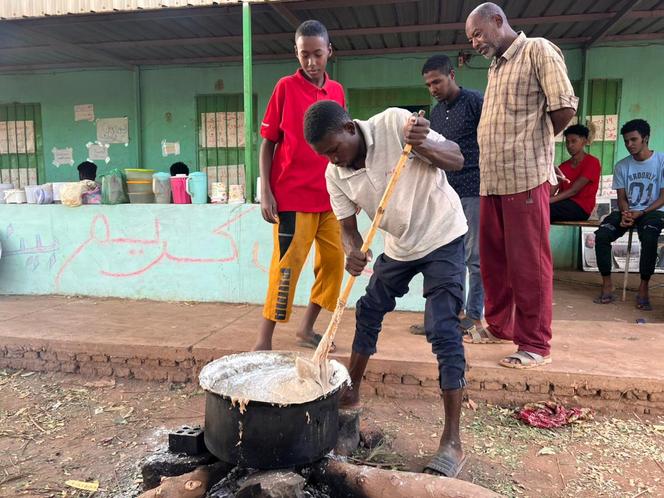


The clamor of bombardments and heavy gunfire had drowned out the call to prayer that echoed through the streets of Khartoum. Ramadan began on Monday, March 11, but the clashes in Sudan's capital continue unabated. This situation has an air of déjà vu about it: Almost a year ago, on April 15, 2023, the war between the Sudanese Armed Forces and the paramilitary Rapid Support Forces (RSF) organization began in the middle of this month of fasting, just a few days before Eid al-Fitr.
Eleven months later, Khartoum has remained at the epicenter of the fighting. The city has been drained of almost half of its population: Over 3 million people have been forced into exile. The other half have decided to stay in this city that has become a battlefield. Neighborhood by neighborhood, they have organized themselves and are trying to survive on their own.
In Al-Jiref Gharb, a neighborhood in the east of Khartoum, a schoolyard has been converted into a soup kitchen. In videos sent to Le Monde, volunteers prepared iftar, the meal that breaks the day's fasting, for dozens of local residents. Rice and lentils simmered in large zinc pots. At the other end of the city, in the Beit al-Mal neighborhood, a community run by Sheikh Al-Amin, a Sufi spiritual leader, has opened its doors to nearly 100 families fleeing the atrocities committed by soldiers. "We have a refectory where we prepare almost 3,000 meals a day, a prayer center, a clinic, dormitories and even a bakery," explained a religious figure in charge of the sanctuary called al-Masid.
More than 300 such community canteens have sprung up across the capital. Although they are sometimes funded by local community leaders, most of the time these initiatives have come into being thanks to the efforts of independent mutual aid groups, which bring together volunteers, seasoned political activists, doctors and social workers – often drawn from the "resistance committees," neighborhood organizations that were the backbone of the revolution that led to the fall of Omar al-Bashir in 2019.
With over 70% of Khartoum's hospitals out of action, these groups have set up makeshift clinics that take in the chronically ill and those wounded in the war, free of charge. "We sometimes work on the floor, with little equipment, and we only manage to save very few people," explained Omar (whose name has been changed for security reasons), a member of the mutual aid group in the al-Fitehab neighborhood on the west bank of the White Nile.
You have 66.33% of this article left to read. The rest is for subscribers only.
